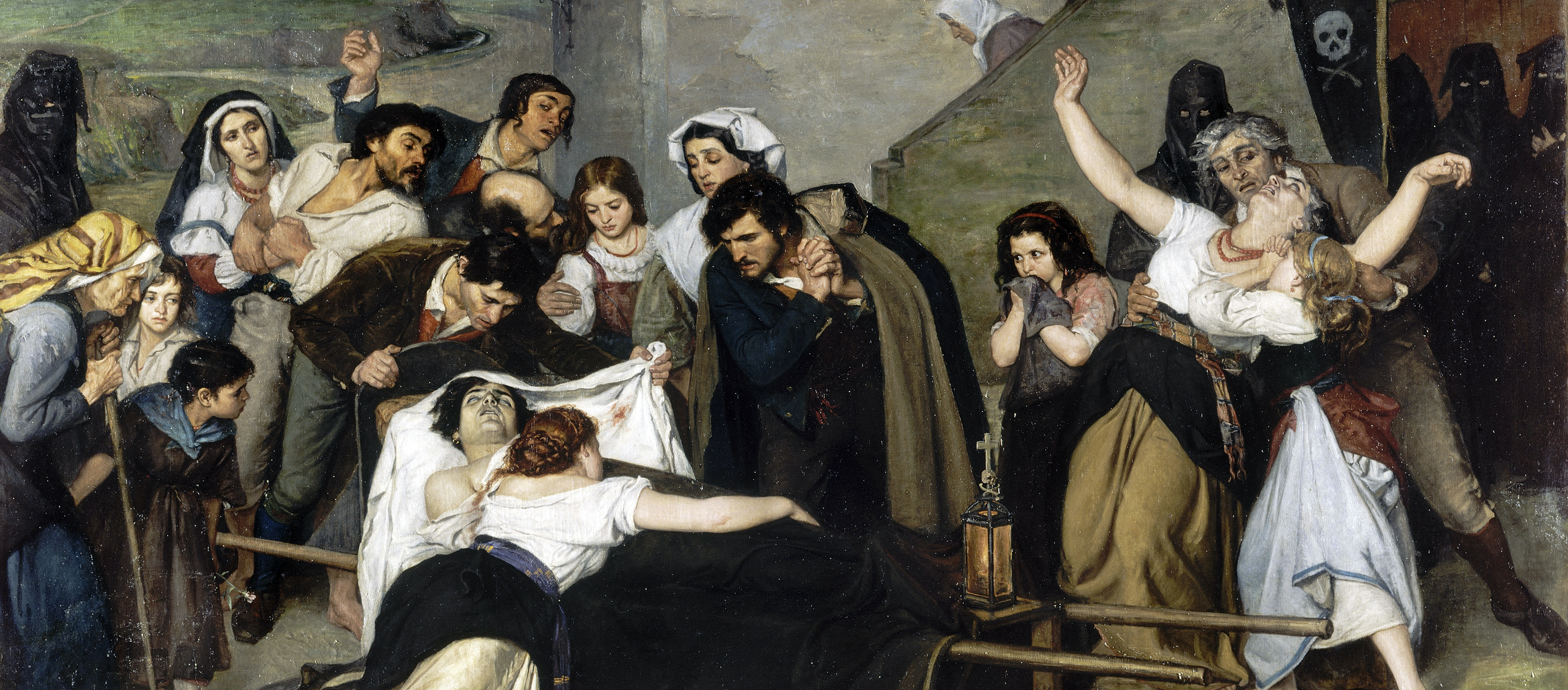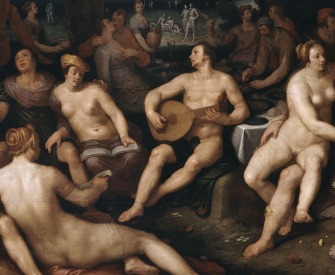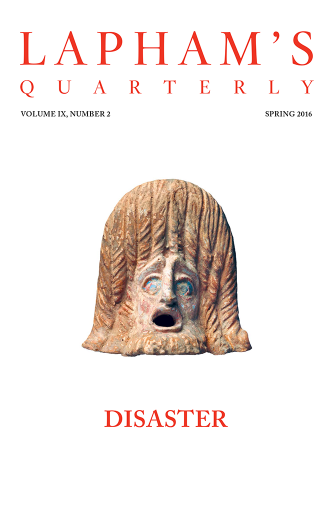It is noble to die before doing anything that deserves death.
—Anaxandrides, 376Natural Law
Henry David Thoreau meditates upon a shipwreck.
We left Concord, Massachusetts, on Tuesday, October 9. On reaching Boston, we found that the Provincetown steamer, which should have got in the day before, had not yet arrived, on account of a violent storm; and as we noticed in the streets a handbill headed, “Death! 145 lives lost at Cohasset,” we decided to go by way of Cohasset.
We found many Irish in the cars, going to identify bodies and to sympathize with the survivors and also to attend the funeral which was to take place in the afternoon—and when we arrived at Cohasset it appeared that nearly all the passengers were bound for the beach, which was about a mile distant, and many other persons were flocking in from the neighboring country. There were several hundreds of them streaming off over Cohasset common in that direction, some on foot and some in wagons, and among them were some sportsmen in their hunting jackets, with their guns and game bags and dogs. As we passed the graveyard we saw a large hole, like a cellar, freshly dug there, and just before reaching the shore, by a pleasantly winding and rocky road, we met several hay riggings and farm wagons coming away toward the meeting house, each loaded with three large, rough deal boxes. We did not need to ask what was in them. The owners of the wagons were made the undertakers. Many horses in carriages were fastened to the fences near the shore, and for a mile or more, up and down, the beach was covered with people looking out for bodies and examining the fragments of the wreck. There was a small island called Brook Island, with a hut on it, lying just off the shore. This is said to be the rockiest shore in Massachusetts, from Nantasket to Scituate—hard syenitic rocks, which the waves have laid bare but have not been able to crumble. It has been the scene of many a shipwreck.
The brig St. John, from Galway, Ireland, laden with emigrants, was wrecked on Sunday morning; it was now Tuesday morning, and the sea was still breaking violently on the rocks. There were eighteen or twenty of the same large boxes that I have mentioned lying on a green hillside, a few rods from the water and surrounded by a crowd. The bodies which had been recovered, twenty-seven or twenty-eight in all, had been collected there. Some were rapidly nailing down the lids, others were carting the boxes away, and others were lifting the lids, which were yet loose, and peeping under the cloths—for each body, with such rags as still adhered to it, was covered loosely with a white sheet.

The Murdered Man, by Carolus-Duran, 1866. Le Palais des Beaux-Arts de Lille, Lille, France.
We kept on down the shore as far as a promontory called Whitehead, that we might see more of the Cohasset rocks. In a little cove, within half a mile, there were an old man and his son collecting with their team the seaweed which that fatal storm had cast up, as serenely employed as if there had never been a wreck in the world, though they were within sight of the Grampus Rock, on which the St. John had struck. The old man had heard that there was a wreck and knew most of the particulars, but he said that he had not been up there since it happened. It was the wrecked weed that concerned him most, rock weed, kelp, and seaweed, as he named them, which he carted to his barnyard; and those bodies were to him but other weeds which the tide cast up, but which were of no use to him. We afterward came to the lifeboat in its harbor, waiting for another emergency—and in the afternoon we saw the funeral procession at a distance, at the head of which walked the captain with the other survivors.
On the whole, it was not so impressive a scene as I might have expected. If I had found one body cast upon the beach in some lonely place, it would have affected me more. I sympathized rather with the winds and waves, as if to toss and mangle these poor human bodies was the order of the day. If this was the law of nature, why waste any time in awe or pity? If the last day were come, we should not think so much about the separation of friends or the blighted prospects of individuals. I saw that corpses might be multiplied, as on the field of battle, till they no longer affected us in any degree, as exceptions to the common lot of humanity. Take all the graveyards together, they are always the majority. It is the individual and private that demands our sympathy. A man can attend but one funeral in the course of his life, can behold but one corpse. Yet I saw that the inhabitants of the shore would be not a little affected by this event. They would watch there many days and nights for the sea to give up its dead, and their imaginations and sympathies would supply the place of mourners faraway, who as yet knew not of the wreck. Many days after this, something white was seen floating on the water by one who was sauntering on the beach. It was approached in a boat and found to be the body of a woman, which had risen in an upright position, and whose white cap was blown back with the wind. I saw that the beauty of the shore itself was wrecked for many a lonely walker there, until he could perceive, at last, how its beauty was enhanced by wrecks like this, and it acquired thus a rarer and sublimer beauty still.
Why care for these dead bodies? They really have no friends but the worms or fishes. Their owners were coming to the New World, as Columbus and the Pilgrims did—they were within a mile of its shores, but before they could reach it, they emigrated to a newer world than ever Columbus dreamed of yet one of whose existence we believe that there is far more universal and convincing evidence—though it has not yet been discovered by science—than Columbus had of this: not merely mariners’ tales and some paltry driftwood and seaweed but a continual drift and instinct to all our shores. I saw their empty hulks that came to land, but they themselves, meanwhile, were cast upon some shore yet farther west, toward which we are all tending and which we shall reach at last—it may be through storm and darkness—as they did. No doubt, we have reason to thank God that they have not been “shipwrecked into life again.” The mariner who makes the safest port in heaven, perchance, seems to his friends on earth to be shipwrecked, for they deem Boston Harbor the better place; though perhaps invisible to them, a skillful pilot comes to meet him, and the fairest and balmiest gales blow off that coast, his good ship makes the land in halcyon days, and he kisses the shore in rapture there, while his old hulk tosses in the surf here. It is hard to part with one’s body, but, no doubt, it is easy enough to do without it when once it is gone. All their plans and hopes burst like a bubble! Infants by the score dashed on the rocks by the enraged Atlantic Ocean! No, no! If the St. John did not make her port here, she has been telegraphed there. The strongest wind cannot stagger a spirit; it is a spirit’s breath. A just man’s purpose cannot be split on any Grampus or material rock, but itself will split rocks till it succeeds.

Henry David Thoreau
From Cape Cod. At the age of twenty-seven in 1845, Thoreau built a cabin on the shores of Walden Pond on a plot of land owned by his friend Ralph Waldo Emerson. Thoreau was imprisoned the following year for not paying his poll taxes, an experience that helped to inspire his essay “Civil Disobedience,” in which he remarked, “Under a government which imprisons any unjustly, the true place for a just man is also a prison.” He had spent one night in jail. “Wishing to get a better view” of the ocean, Thoreau made his first of four trips to Cape Cod in 1849.




